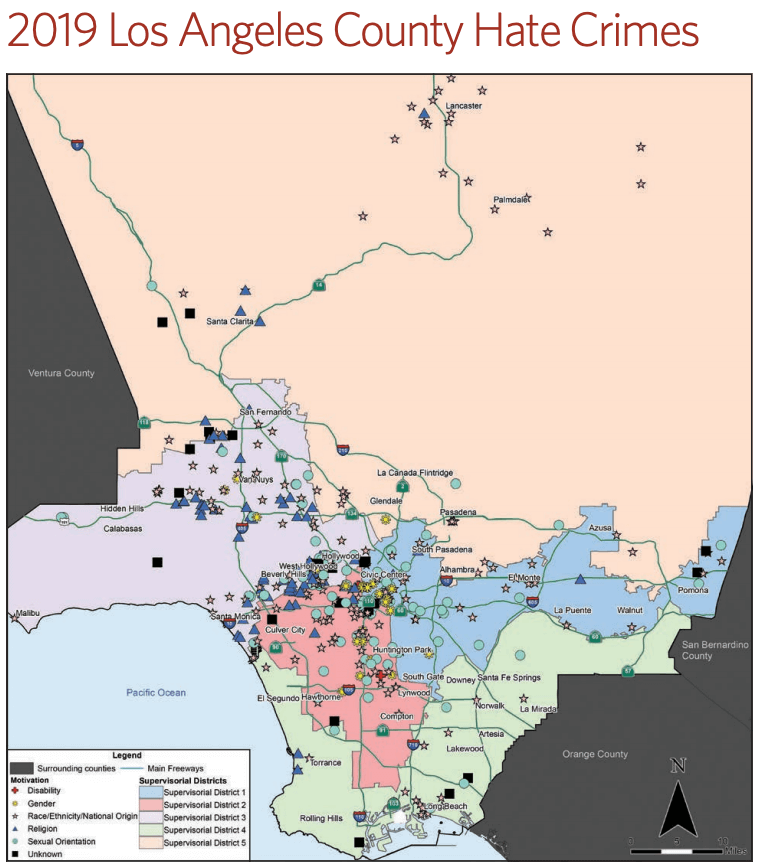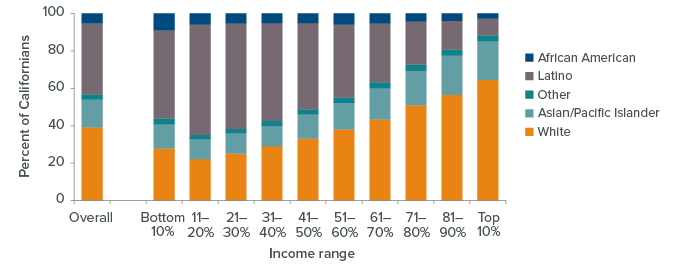Racism, Hate and Public Education

Stacked Against Equity
California is making 2020 the year that racial equity is front and center on the ballot and on the education agenda. It can't wait.
The data on racism is compelling. By some measures, it's getting worse. According to the Pew Research Center, a majority of Asian adults (58%) say it is more common for people to express racist or racially insensitive views than it was before the coronavirus outbreak. Black adults (45%) also say it is more common.
The Los Angeles County 2019 Hate Crime Report shows that hate crimes containing evidence of white supremacy increased 38% in 2019. Religious crimes grew 11%, the majority anti-semitic. Anti-transgender crimes increased 64% and most involved violence. The image below shows the location of hate crimes in Los Angeles based on disability, gender, race, religion, and sexual orientation. The character of hate crimes varies by neighborhood, reflecting the complexity of this issue.

Racial Disparities
A study by the Public Policy Institute of California shows deep racial disparities in criminal justice, health, income, wealth, and education, particularly between white Californians and African Americans:
“Despite California’s relatively small African American population (6%)… roughly 16% of all arrests are of African Americans. African Americans account for 26% of the state’s probation population, about 25% of the jail population, and 29% of the prison population.”
Michelle Alexander, author of The New Jim Crow, Mass Incarceration in the Age of Color Blindness, speaks passionately on this subject: “Incarceration rates, especially black incarceration rates, have soared regardless of whether crime is going up or down in any given community or the nation as a whole."
California currently denies the vote to those who have been incarcerated, even after their term is completed. Proposition 17 on the ballot would align California with other states that restore voting rights upon completion of a prison sentence.
Wealth and Income Gap
The gap between rich and poor is dramatic. White and Asian families are overrepresented in the highest income ranges. African American and Latino families have much lower wealth levels.
White and Asian families are overrepresented among the highest incomes in California

Source: PPIC analysis of IPUMS ACS data (2018) by Sarah Bohn and Tess Thorman.
NOTES: Chart shows the overall share of Californians categorized by the race/ethnicity of their family head (first bar) and by their location in the income distribution. Income is calculated at the family level before taxes and safety net transfers, which includes income from earnings, business, investments, retirement, social security, and other sources.
Racism and Education
These racial disparities have profound effects on families, children and education. Poverty, trauma, health, and family support directly influence how well children do in school. An African American child living in poverty with a parent in jail does not have the same opportunities as a child in a white middle class home.
Every day our schools teach children who are victims of these inequities. Schools need the funding and support not only to help these students succeed but to teach all students the ideals of equality and the skills to form a more perfect union.
“We know that bias exists in every sector of society. Now is our time to speak, and to address racism and implicit bias in education.”
— Tony Thurmond, California Superintendent of Public Instruction
Equity and Money on the Ballot
Two initiatives on the ballot in November 2020 tackle equity and funding.
Proposition 16: The California legislature put Proposition 16 on the ballot to address historic racial and gender discrimination. This constitutional amendment asks the voters whether state and local entities should consider race, sex, color, ethnicity, and national origin in public education, public employment, and public contracting. More on Prop.16 here.
“Irrespective of the merits of a colorblind society, the data suggests that we are not currently living in one. Instead, the data suggests that we live in a deeply unequal society, where the tools to compete in society are unevenly distributed and distributed in a manner that perpetuates inequality between races and genders at all levels of class and society."
— Senate analysis
Proposition 15: Within the context of the historic underfunding of California schools and tattered budgets caused by COVID-19, money raised by Proposition 15 will help build back the funding our schools need and direct it towards our most needy students. It will generate up to about $12 billion annually for support of schools (~40%) and communities (~60%). The money is raised by assessing commercial and industrial property worth more than $3 million at market value. More on Prop.15 here.
New Efforts to Confront Racism Through Education
California is testing several strategies to confront inequities and racism: reparations, ethnic studies, police reform, and improved training for educators.
Education to End Hate
In 2020, California passed the first-in-the-nation law to study and make recommendations on reparations for slavery to address "disparities born of a shameful history." To confront the hate, bigotry, and racism in communities across the state, California's Superintendent of Public Instruction, Tony Thurmond, is promoting a project under the name Education to End Hate.
Educator training grants, partnerships with community leaders, and virtual classroom sessions will try to leverage the power of education to create a more just society. The California Department of Education will train all of its employees on implicit bias and create guidance for school districts to address inequities that students of color face, including academic achievement gaps and disproportionate discipline.
Ethnic Studies
Webinar Series
African American Studies
Chicano Latino American Studies
Asian American Studies
Indigenous Studies
To help students learn about the racial history of our state, the California State University system now requires ethnic studies as a graduation requirement.
A bill to create a similar requirement for high schools was vetoed by Governor Newsom, who felt the curriculum was not yet ready. The administration is working with the President of the State Board of Education and the Superintendent of Public Instruction on a revised draft.
School Police Reforms
A statewide Task Force is looking at the controversial role of police officers in schools. Policy recommendations will include:
- Establishing best practices and requirements for school police;
- Promoting and funding alternative programs such as restorative justice and intervention programs; and
- Creating more data collection, monitoring, and accountability.
In the coming year, new legislation is likely to address racial issues in policing throughout the state.
School Districts Also Confront Racism
Most education policy is developed and implemented at the local level. Here are some examples:
- The San Diego Unified School District is implementing a menu of changes including better staff training and recruiting more diverse educators. The district is also changing the grading system to eliminate bias. Teachers can no longer consider things like getting homework in on time and classroom behavior.
- The San Francisco Unified School District will develop a black ethnic studies curriculum. It is looking — not without controversy — at changing the names of 44 schools that do not meet anti-bias criteria designed by an advisory group.
- Los Angeles Unified School District has partnered with the USC Race and Equity Center to help principals address racism and equity. The district is expanding ethnic studies to ensure that teaching materials at all grade levels include texts written by authors of color, particularly Black writers.
What’s Happening at Your School? Tell Us.
Parents throughout the state are also dealing with the issue of racism. What is happening at your school? What strategies are helping? What needs to change?
Tags on this post
All Tags
A-G requirements Absences Accountability Accreditation Achievement gap Administrators After school Algebra API Arts Assessment At-risk students Attendance Beacon links Bilingual education Bonds Brain Brown Act Budgets Bullying Burbank Business Career Carol Dweck Categorical funds Catholic schools Certification CHAMP Change Character Education Chart Charter schools Civics Class size CMOs Collective bargaining College Common core Community schools Contest Continuous Improvement Cost of education Counselors Creativity Crossword CSBA CTA Dashboard Data Dialogue District boundaries Districts Diversity Drawing DREAM Act Dyslexia EACH Early childhood Economic growth EdPrezi EdSource EdTech Education foundations Effort Election English learners Equity ESSA Ethnic studies Ethnic studies Evaluation rubric Expanded Learning Facilities Fake News Federal Federal policy Funding Gifted Graduation rates Grit Health Help Wanted History Home schools Homeless students Homework Hours of opportunity Humanities Independence Day Indignation Infrastructure Initiatives International Jargon Khan Academy Kindergarten LCAP LCFF Leaderboard Leadership Learning Litigation Lobbyists Local control Local funding Local governance Lottery Magnet schools Map Math Media Mental Health Mindfulness Mindset Myth Myths NAEP National comparisons NCLB Nutrition Pandemic Parcel taxes Parent Engagement Parent Leader Guide Parents peanut butter Pedagogy Pensions personalized Philanthropy PISA Planning Policy Politics population Poverty Preschool Prezi Private schools Prize Project-based learning Prop 13 Prop 98 Property taxes PTA Purpose of education puzzle Quality Race Rating Schools Reading Recruiting teachers Reform Religious education Religious schools Research Retaining teachers Rigor School board School choice School Climate School Closures Science Serrano vs Priest Sex Ed Site Map Sleep Social-emotional learning Song Special ed Spending SPSA Standards Strike STRS Student motivation Student voice Success Suicide Summer Superintendent Suspensions Talent Teacher pay Teacher shortage Teachers Technology Technology in education Template Test scores Tests Time in school Time on task Trump Undocumented Unions Universal education Vaccination Values Vaping Video Volunteering Volunteers Vote Vouchers Winners Year in ReviewSharing is caring!
Password Reset
Search all lesson and blog content here.
Login with Email
We will send your Login Link to your email
address. Click on the link and you will be
logged into Ed100. No more passwords to
remember!














Questions & Comments
To comment or reply, please sign in .